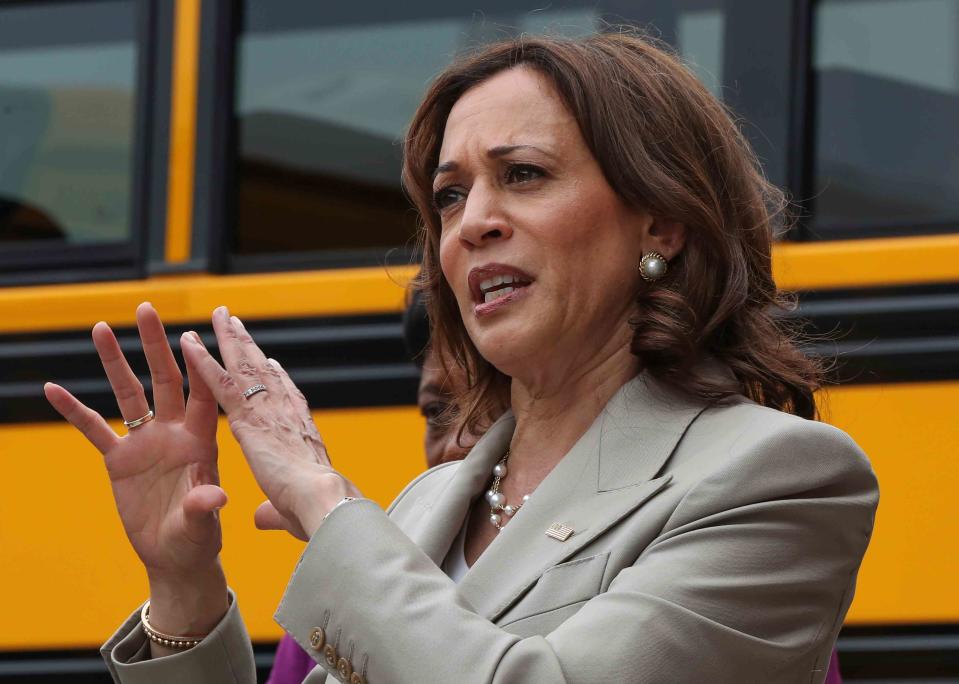VP Kamala Harris Announces $1 Billion for Electric School Buses
In an exclusive interview with Parents, the Vice President shared how this investment is part of an effort to improve school infrastructure, domestic jobs, and public health.

Jemal Countess/Getty Images
This week, Vice President Kamala Harris announced nearly $1 billion in rebate awards for school districts to purchase approximately 2,500 low-emission and electric school buses that will roll into communities across the country next year. The Environmental Protection Agency's Clean School Bus Program, which is funded by the Bipartisan Infrastructure Law, is a critical step in combatting environmental racism, and improving the social, economic, and environmental health in low-income, rural, and Tribal communities.
The Biden-Harris administration ran on a pledge to tackle environmental justice issues with the promise of improving the quality of life for those in underserved areas. Today, about 95% of school buses run on diesel fuel, exposing nearly 25 million children to "toxic air," Vice President Harris tells Parents in an exclusive interview.
And while transportation-related air pollution declined between 2000-2010, communities of color were exposed to nearly 40% higher concentrations of nitrogen dioxide (NO2) than white communities, putting them at an increased risk of respiratory conditions, according to a study published in the journal Environmental Health Perspectives in 2017. Low-income communities and communities of color are also more likely to live near high-traffic roads, the study found.
"There are real disparities based on race, based on income, in terms of which communities suffer the most when it comes to environmental damage, pollution, and dumping," Harris tells Parents. "And so it is an issue that we must acknowledge, which is that while all communities experience the effects of the climate crisis, not all communities have the same effect because of their inability or ability to respond with the resources necessary."
Related:
The vast majority of the nation's nearly 500,000 school buses run on diesel fuel, which emits harmful particulates, carbon monoxide, and nitrogen oxides. These pollutants can cause respiratory and cardiovascular health issues, and children who are routinely exposed to diesel soot are at an increased risk for asthma, pneumonia, and bronchitis, according to the Centers for Disease Control and Prevention.
Pollution has disproportionate impacts across racial and socio-economic groups. The EPA reports that Black children "have a 500% higher mortality rate from asthma" compared to white children; in total, approximately 13% of Black children have asthma, while about 8% of white children do. Pollution-caused respiratory issues also harm children by keeping them out of school.
"When you look at the correlation between missed days of school and what that means in terms of creating real gaps in a child's educational progress, that's real," says Harris. "You can look at a number of issues that are some of the biggest factors that contribute to absenteeism—asthma is one of them… What that means in terms of taking away or decreasing the strength of the foundation in the earliest years of education is pretty significant."
Additionally, poor air quality has been linked to higher death rates among people with COVID-19, as "respiratory stress…[increases] vulnerability to severe illness," according to the American Lung Association. People of color are disproportionately impacted by COVID, and approximately 60% of all pediatric COVID deaths have been children of color.
"While all communities experience the effects of the climate crisis, not all communities have the same effect because of their inability or ability to respond with the resources necessary."
Related:
Diesel pollution also causes severe health problems in adults. The Clean Air Task Force reports that "exposure to diesel pollution causes 27,000 heart attacks, 14,000 hospitalizations, and 2.4 million lost work days each year." Low wages, the pandemic, and pollution-related illnesses may all contribute to the ongoing school bus driver shortage, with repercussions on public health, the economy, and children's education.
Ninety-five percent of the newly announced school buses will be electric, while a small percentage will run on compressed natural gas and propane. The EPA's Clean Bus Program announcement was part of a six-month progress report on the Biden-Harris Action Plan for Building Better School Infrastructure, which aims to improve air quality, energy efficiency, ventilation, and transportation. Future progress reports will be critical for administration accountability and public transparency. The EPA publishes an annual report of the total greenhouse gas emissions produced in the U.S.; transportation makes up the highest percentage of emissions.
Nearly 2,000 school districts applied for the first round of rebates from all 50 states, including Washington, D.C., U.S. territories, and federally recognized tribes. The demand was so high "that the EPA had to double the amount of funding" from its initial pledge of $500 million, a White House official tells Parents on background. A total of 391 rebates were awarded, and the Vice President anticipates thousands more applications as the EPA's Clean School Bus Program awards a total of $5 billion over the next five years.
Related:
The investment, Harris says, is about addressing the intersectionality of curbing greenhouse gas emissions, creating domestic jobs in the clean energy sector, improving education, and enhancing public health—all of which are necessary to lessen the impacts of environmental racism on communities for generations to come.
"I'm very excited about [the Clean School Bus Program] because I think that it is a demonstration of our administration's commitment to invest in innovation, understanding we don't have to accept a false choice," says Harris. "Let's invest in clean energy. Let's create a clean-energy future but also see the correlation between that and job creation and public health."
false

